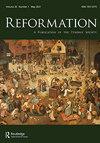Twelfth Night and the Economics of Christian Charity
IF 1.1
0 RELIGION
引用次数: 0
Abstract
ABSTRACT Beginning in 1587, all theatrical companies were required to make weekly donations to local poor in exchange for permission to perform in London’s suburbs. While robust networks of charity were probably more vital than ever to the social welfare of London and its citizens, the Reformation had disrupted previous forms of benevolence, giving way for new opportunities and new religious justifications for these practices. Shakespeare’s Twelfth Night (c. 1601) reflects and underscores both the economic and religious prerogatives of charity for its audiences. Staged as part of the year’s Christmastide revels, the play takes part in seasonal religious practices and gift-giving and emphasizes the need for individuals to live in comity with one another. Its message auspiciously coincided with its namesake. The feast of Epiphany, or Twelfth Day, commemorates the revelation of Christ to the gentiles , and sermons throughout this season typically exposited the value of charity.第十二夜与基督教慈善的经济学
摘要从1587年开始,所有戏剧公司都被要求每周向当地穷人捐款,以换取在伦敦郊区演出的许可。尽管强大的慈善网络对伦敦及其公民的社会福利可能比以往任何时候都更为重要,但宗教改革破坏了以前的慈善形式,为这些做法提供了新的机会和新的宗教理由。莎士比亚的《第十二夜》(约1601年)反映并强调了慈善对观众的经济和宗教特权。作为今年圣诞节狂欢的一部分,该剧参与了季节性的宗教活动和送礼活动,并强调了个人相互礼让的必要性。它所传达的吉祥信息与它的名字不谋而合。主显节,或称第十二天,是为了纪念基督向外邦人的启示,整个季节的布道通常都会揭示慈善的价值。
本文章由计算机程序翻译,如有差异,请以英文原文为准。
求助全文
约1分钟内获得全文
求助全文

 求助内容:
求助内容: 应助结果提醒方式:
应助结果提醒方式:


